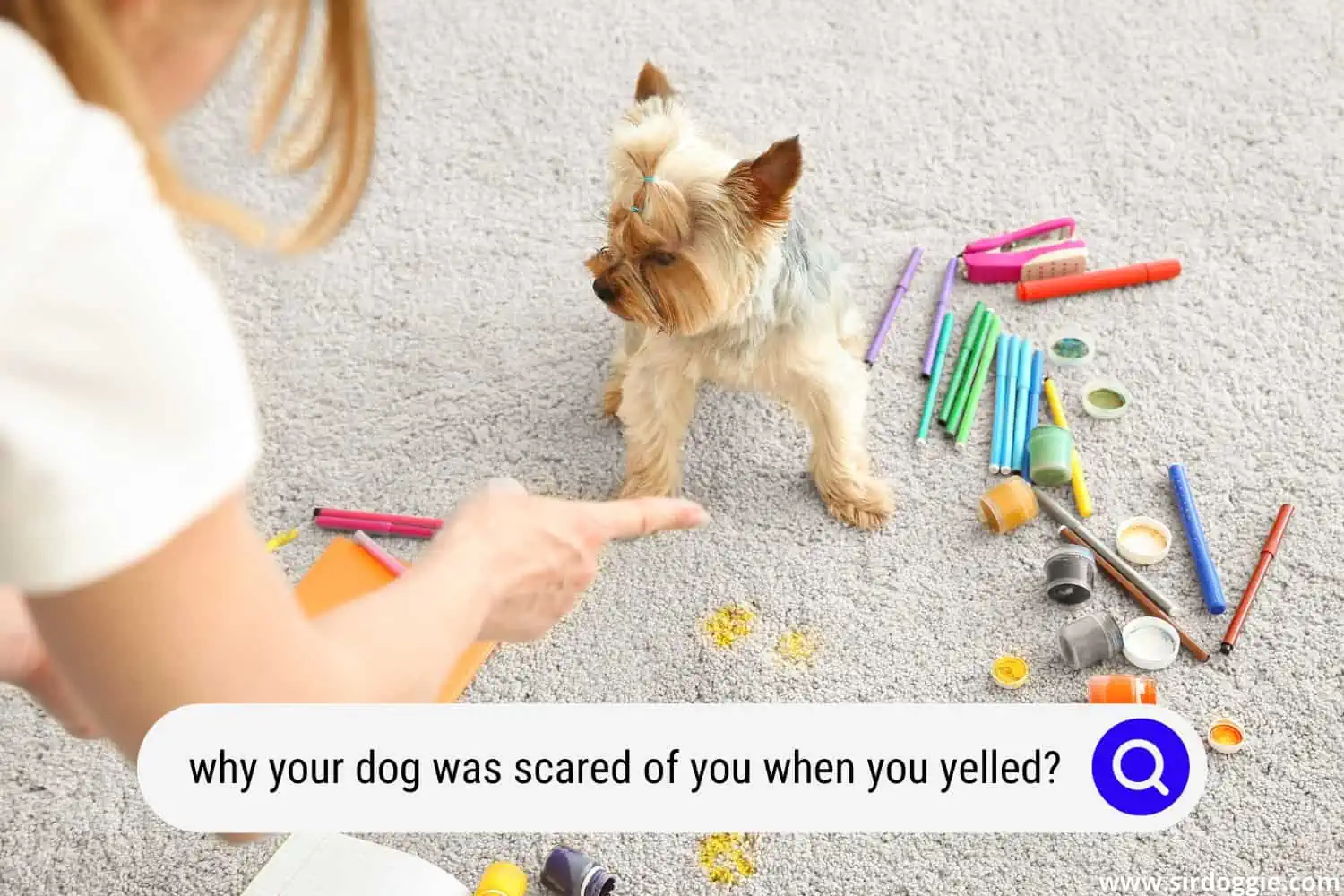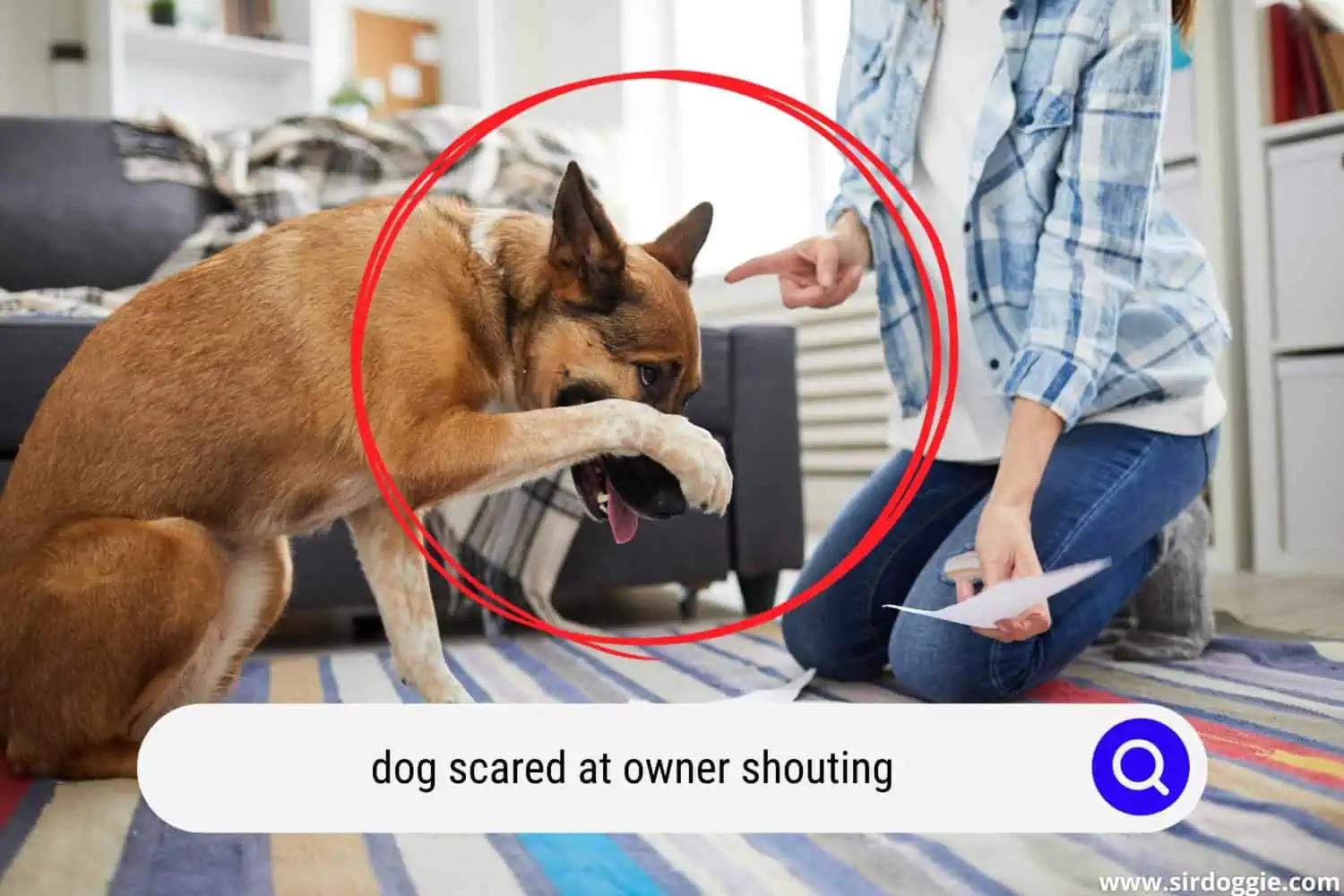Why Your Dog Was Scared of You When You Yelled (4 Reasons)
Dogs are essentially very enthusiastic and curious creatures. As a result, they often engage with the world around them with great excitement and curiosity. Although dogs may experience times or situations in which they feel nervous or fearful, you must help them avoid these scenarios as much as possible.

Every dog has a distinct personality that is impacted by its breed, prior experiences, and individual disposition, among other things. It needs to be understood that each dog’s nature is different—just like the different personalities belonging to each of us.
Some dog breeds are more sensitive and more prone to barking/howling, boredom, or fear. For example, Huskies are very sensitive to their owners and may get scared when their owners yell at them. More than most animals, dogs become extremely attached to their owners and trust them deeply; so, when you yell at your dog without any reason, he/she may take it seriously and get scared.
If you continue this type of behavior towards them, it may lead to fear, stress, anxiety, and behavioral disorders stemming directly from the negative and unacceptable way in which you’re treating them.
The Top 4 Reasons Why Your Dog is Scared of You
Like humans, dogs are susceptible to various worries, including a sensitivity to yelling (as discussed above), separation anxiety, and a fear of thunderstorms. Several stressors that cause fear are inherent to the canine, while others result from terrifying experiences with their owners or come from environmental or physical conditions.
It will benefit both you and your furry companion if you can identify and address these common dog concerns. It will also help you build a good relationship with your dog to know exactly what upsets him or her and what can be avoided.
1. “What is your reason for abandoning me?” — Separation anxiety in dogs leads to scared dogs.

When you initially brought your dog home, they were almost certainly showered with attention, love, and affection. But as time passes, your affection and care towards your canine companion is bound to decrease, or your job or vacation will eventually lead to you being away from them for an extended period. This hurts canines and can convert your happy and alert dog into a scared or furious dog.
Dogs’ separation anxiety is a valid cause for concern. A nervous or scared dog can destroy property, excessively bark, or engage in other compulsive behaviors such as gnawing on its tail.
Training Tips
- Practice your departure activities, such as collecting your belongings and keys, and return quickly with treats to reward your dogs. Some of the negative associations that induce fearfulness or distress can be alleviated with this desensitization practice.
- Before your departure, exhaust your dog with some type of physical activity (such as a walk or a game of fetch) to ensure that he has enough energy to properly relax while you’re away.
- Consider hiring a pet sitter to help with your dog’s loneliness or separation issues as a transitional or ongoing solution to help lessen the stress levels of your canine companion while you’re out.
2. “Did you hear something?” — Noise anxiety leads to scared dogs.
Another common source of fearfulness in dogs—along with being yelled at—is noise phobia, which can be brought on by various stimuli, such as fireworks, thunderstorms, and even the vacuum cleaner.
It is vital to learn how to react or not react when faced with noises that are either abrupt or persistent to avoid a dog panic episode from occurring. Your dog looks to you for guidance, so staying calm and composed is the most helpful thing you can do when your dog is becoming distressed.
Training Tips
- Keep cool by behaving as if nothing happened or by helping your dog focus on something enjoyable that he normally would like doing when he isn’t scared.
3. “What exactly are these beings?” — Fear of unknown pets and people may lead to scared dogs.
Canine fearfulness is typically not good for their health and well-being, whether it’s due to a fear of strangers, a fear of other canines, or something else. In all cases, socialization is vital, and achieving this will require both patience and time on the part of the dog’s owner.
Training Tips
- Friends or strangers should not be forced to interact with your dog. It is advisable to let your dog get comfortable with unfamiliar people at a distance rather than getting closer too soon.
- When interacting with other dogs, keep treats available to serve as a reward for maintaining calm while another dog passes nearby.
4. Why is my dog scared of me (without any reason)?
If your adopted dog is scared of you from the beginning, it is most likely due to a traumatic incident that occurred with him or her in the past, especially if they are a rescue dog. If you are patient and persistent, you may still be able to gain your dog’s confidence and trust over time as they learn not to fear you like they may have feared other humans in the past.
Remember that both your body language and your stress level have a significant influence on them, so—from the very start—try to provide love, care, and affection.
Training Tips
- Spend as much time on the ground—as near to your dog’s level as possible—to avoid giving them the impression that you are in charge of the situation.
- Slow, soft actions; kind gestures; and multiple quality treats can all be beneficial in helping a traumatized dog calm down and learn to trust you more.

Signs of Fearfulness in Scared Dogs
Scared dogs mostly display behavioral clues, along with many other signs, if the harmful stimuli (i.e., yelling) persist. The most common signs of scared dogs are as follows:
- Lack of appetite/off-feed
- Anorexia
- Pacing
- Shivering
- Inability to stand
- Panting
- Yawning
- Attempting to hide
- Aggression
- Repetitive behavior (scratching, etc.)
- Lowered body language
- Being too confused for an owner or other individual to get their attention
- Hypersalivation
- Reversal of toilet training
- Hyperactivity
- Licking of the lips
- Growling

Family Dog Expert Author
Hi there! I’m Stuart, a devoted dog lover and family dog expert with over a decade of experience working with our furry companions. My passion for dogs drives me to share my knowledge and expertise, helping families build strong, loving bonds with their four-legged friends. When I’m not writing for SirDoggie, you’ll find me hiking, playing with my beautiful dog, or studying music.